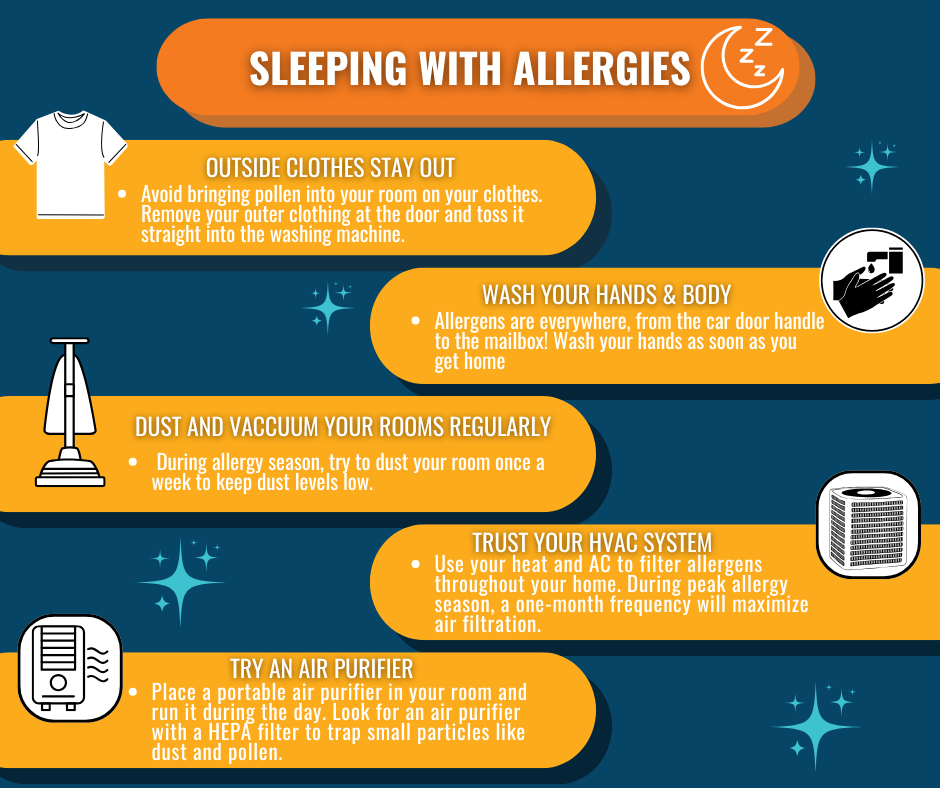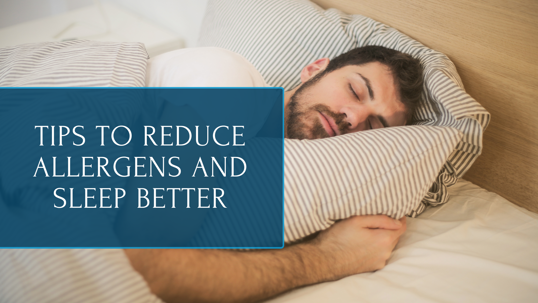Seasonal allergies can take a real toll on your quality of sleep. Long nights of wheezing, tossing, and turning leave allergy sufferers drained. This year, take control of your symptoms with a few useful tips to tamp down allergen and pollen levels in your Jacksonville home and, crucially, where you sleep. Enjoy a better night’s sleep with a few minor tweaks to your home routine!
Allergies and Sleep: What’s the Connection?
It’s likely no surprise that allergies significantly reduce the quality of sleep. Considerable research links allergies to unrestful sleep, which contributes not only to daytime fatigue but also to an increased risk ofdeveloping sleep disorders. Roughly40% of Americans have seasonal allergies, which means there are millions of households trying to sleep with allergies without relying on medication or sleep aids.
However, there are several things you can do to reduce the severity of allergies in the bedroom so you can enjoy better sleep.

Keep Allergens Out of Your Bedroom
Are you tired of losing sleep to your unconquerable allergy symptoms? Give this tried-and-true anti-allergy playbook a shot!
1. Keep pollen out
During allergy season, keep windows and doors closed, especially from late morning to early evening when pollen levels peak.
2. Shower up
When you get home, remove your outer layers of clothing at the door and shower to get pollen off your skin and hair.
3. Get rid of dust mites in your bedroom
Dust accumulates quickly in bedrooms because they tend to be closed off from the rest of the home. We also spend a lot of time there sleeping, relaxing, and getting ready for the day. Dust and vacuum your bedroom weekly to stay ahead of dust, pollen, and other contaminants. You may need to dust your bedroom every other day if you have severe allergies. You’ll sleep much better.
4. Keep pets out of your bedroom
Pet hair and dander are two of the most common allergens that impact sleep. If possible, provide your pet with a cozy place to sleep in a separate room or bedroom floor. Dog beds can cause allergies, especially if your dog spends significant time outside. Wash your pet’s bed as often as you wash your sheets—think weekly!
5. Maintain your HVAC system
A well-maintained HVAC system is the most effective tool for filtering indoor air throughout your home. Along with scheduling annual maintenance, replace your air filter every one to three months to mitigate allergens and dust. If you have pets or underlying respiratory issues, replacing the filter every month can be beneficial, especially during allergy season.
6. Use an air purifier
Air purifiers filter indoor air and improve circulation, lowering the concentration of allergens in your bedroom. Look for a portable air purifier with a HEPA filter, which is rated to trap the smallest airborne particulates.
Where Should I Place My Air Purifier in My Bedroom?
Air purifier placement is critical for maximizing the device’s effectiveness. Ideally, place it near the middle of your room to improve airflow. Place it on a slightly elevated object, such as a sturdy shoebox. This helps move air without obstruction. Just confirm it’s stable and won’t fall over. Finally, place it relatively close to a likely source of allergens, like a pet bed or a surface with a penchant for collecting dust.
Ultimately, the best place for an air purifier in a bedroom is where it can be seen from almost anywhere in the room. It can circulate and purify air throughout the room if visible and unobstructed.
Read More: Easy Ways to Improve Indoor Air Quality
Do Allergy Symptoms Get Worse at Night?
It’s not just you. Allergy symptoms are often worse in the evening when you’re headed to bed because of:
- Histamine – Histamine is the chemical that triggers allergy symptoms, and it tends to be more active at night.
- Pollen levels – Pollen brought into your bedroom during the day has had time to accumulate by nighttime, and you may be stirring it up as you prepare for bed.
- Body position – Lying down changes how mucus moves in your sinuses. This can cause mucus to gather in your nasal passages, leading to sneezing and coughing.
- Temperature changes – Temperature and humidity changes may affect nasal mucus production, contributing to irritation and post-nasal drip.
Take On Allergy Season with Help from David Gray Electrical, Plumbing, Heating & Air
Invest in your home’s indoor air quality and help your family breathe easily. At David Gray Electrical, Plumbing, Heating & Air, we take pride in making your home more comfortable with every replacement, repair, or upgrade.
Call 904-605-8190 orcontact us online to schedule HVAC, electrical, or plumbing services in Jacksonville, FL, and the surrounding areas.

